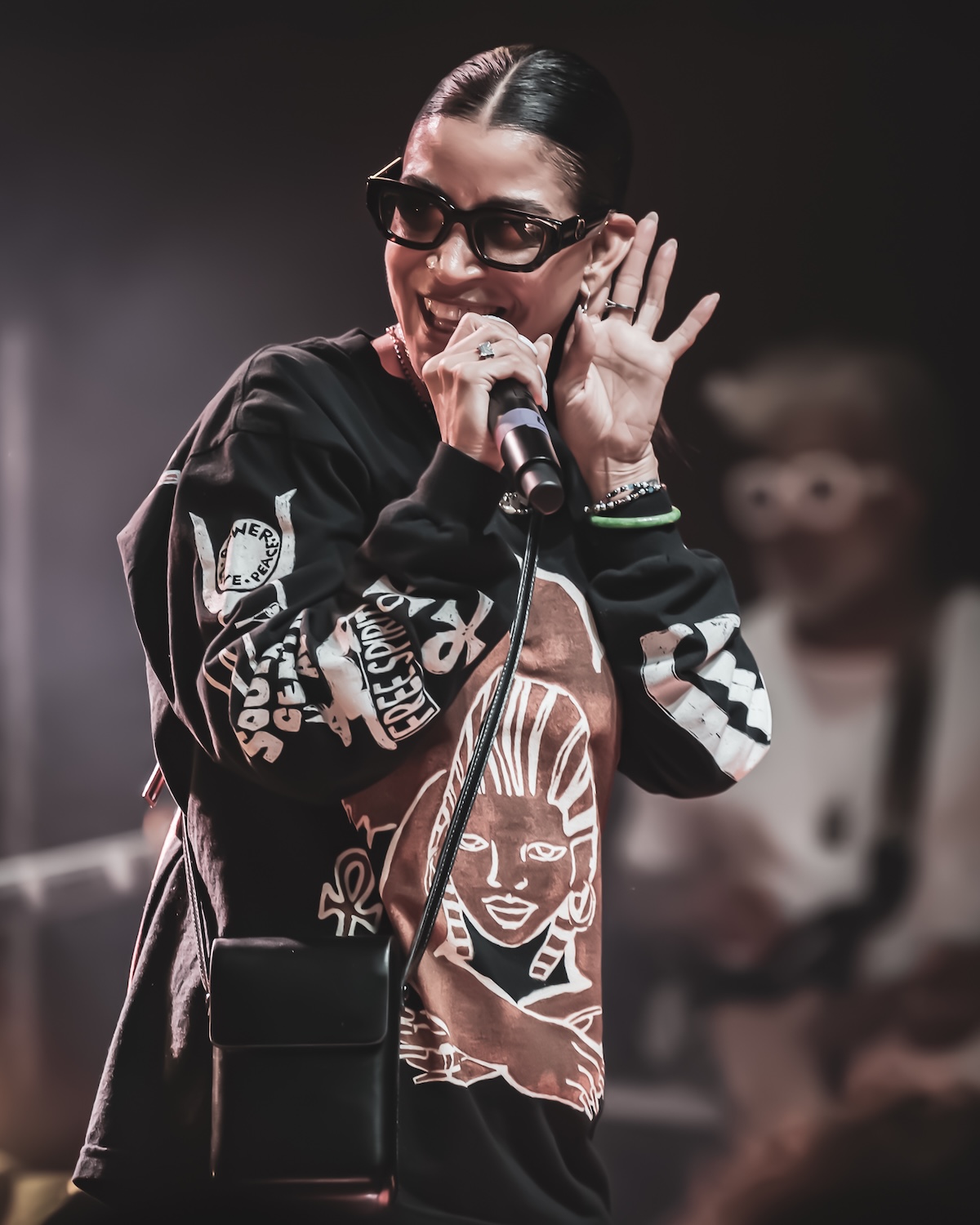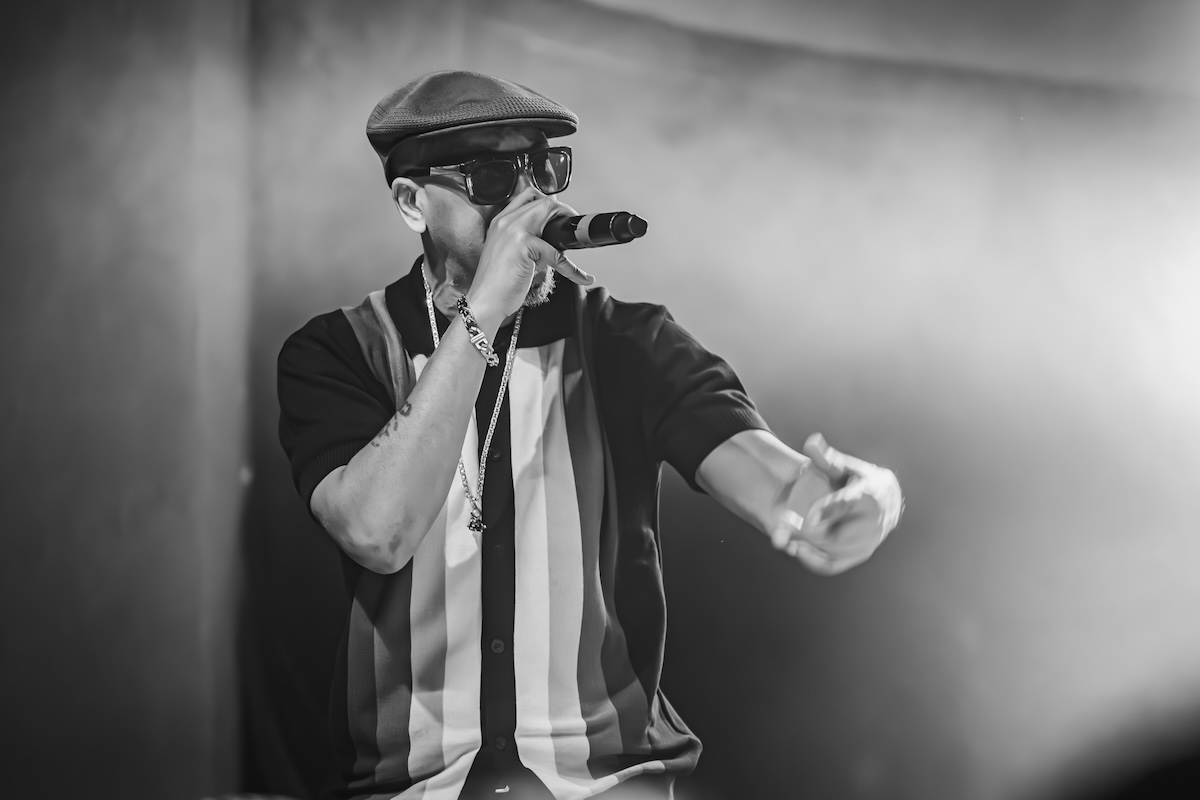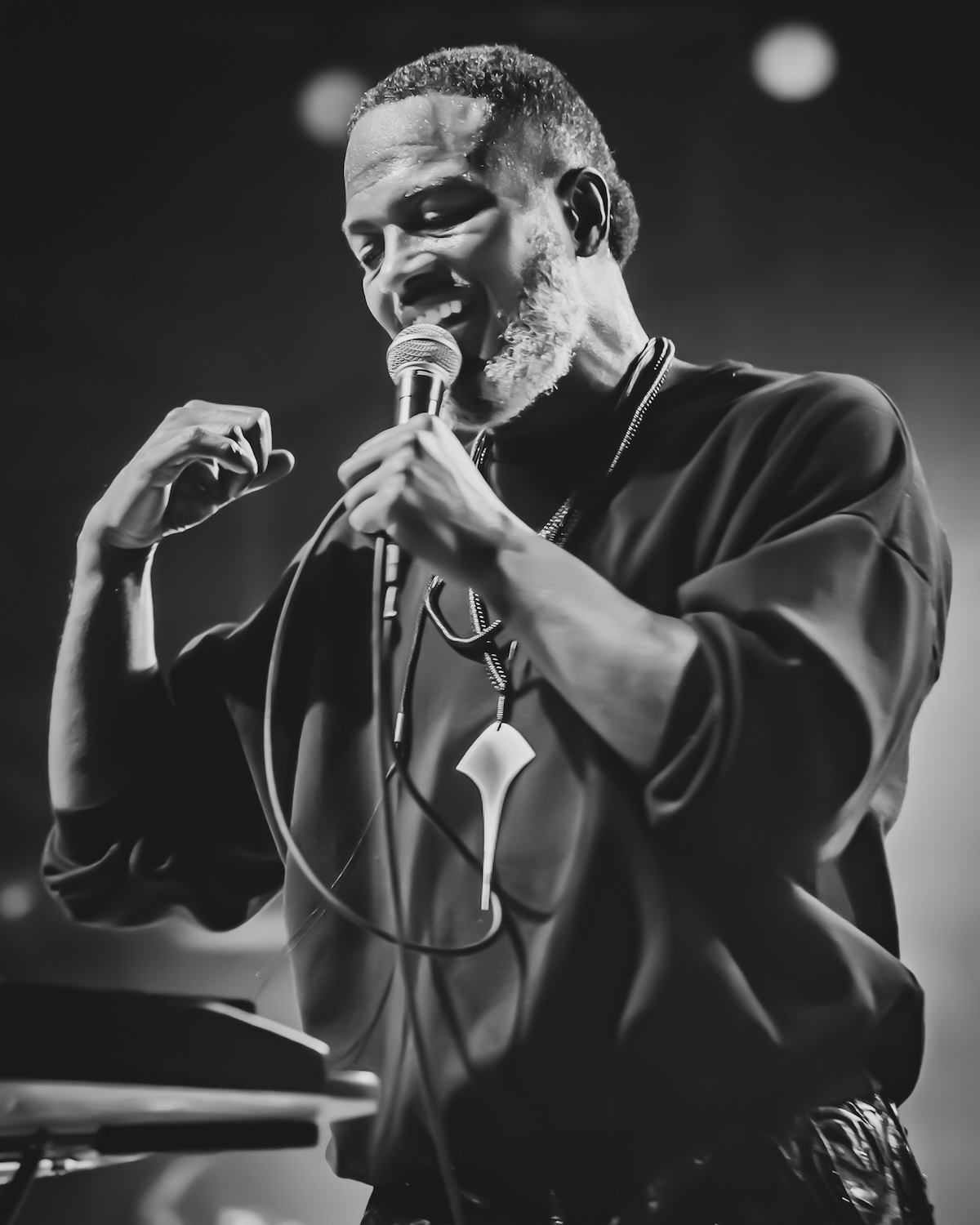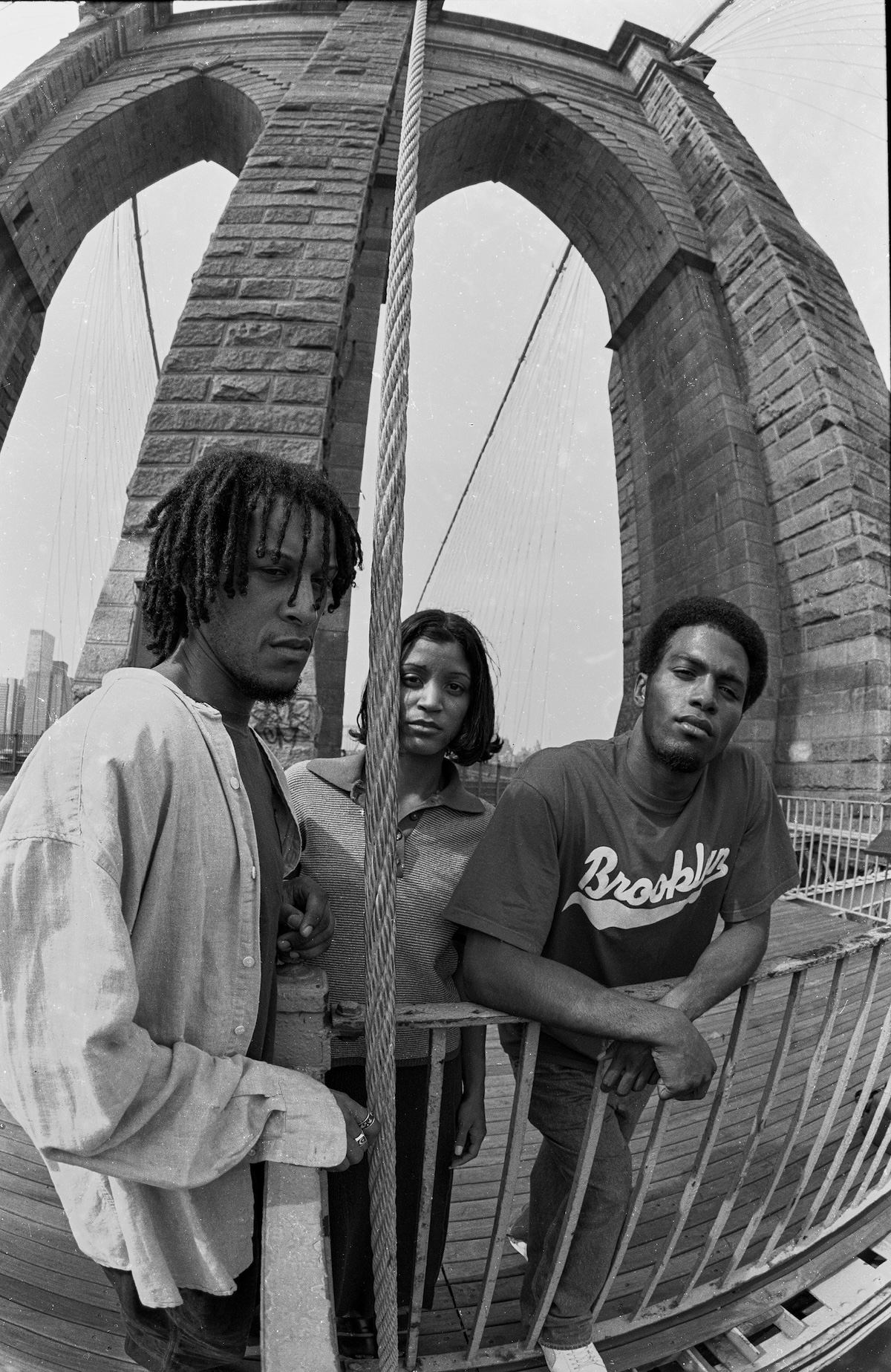It was the summer of 1992, and Ladybug Mecca, Butterfly, and Doodlebug—collectively known as Digable Planets—were recording their debut album, Reachin’ (A New Refutation of Time and Space), commuting back and forth between Brooklyn and a studio in Jersey. They didn’t know it at the time, but the album’s lead single, “Rebirth of Slick (Cool Like Dat),” would change their lives forever.
Arriving in November of that year, the track was an instant crossover hit. It peaked at No. 15 on the Billboard Hot 100 chart, was certified gold by the Recording Industry Association of America four months after its release, and won the trio a Grammy Award in the Best Rap Performance by a Duo or Group category.
With samples including “Blow Your Head” by Fred Wesley and the J.B.’s, “Stretching” by Art Blakey and the Jazz Messengers, “On the Subway” by The Last Poets, and “Impeach the President” by the Honey Drippers, “Rebirth of Slick” was an undeniably smooth amalgamation of jazz, hip-hop, spoken word elements, and funk. Much like the Pharcyde and Souls of Mischief, Digable Planets was the antithesis of the gangsta rap dominating the West Coast at the time and more aligned with the Jungle Brothers, A Tribe Called Quest, De La Soul, and other members of the Native Tongues collective.
As Digable Planets continues the 30th anniversary tour for their sophomore album, Blowout Comb, Mariana “Ladybug Mecca” Vieria, Ishmael “Butterfly” Butler, and Craig “Doodlebug” Irving dive into the making of the song, what made shooting the video so special, and sudden fame.
Doodlebug: I was in between Philly and DC during that time.
Ladybug Mecca: I was in Long Island City.
Butterfly: I think I was in Philly. But that song came later in the process of even recording. So I think we might’ve been in New York at the time. It was one of the last songs we recorded, I think. It was definitely New York or Jersey or whatever. Some details are a little foggy from that amount of time ago, but I think that’s it.
Doodlebug: I was very excited. There was nervous energy, but it was definitely joy and excitement. It was a new adventure, a new world we about to enter. It was crazy. I was excited for sure. Like it was just so many new experiences all at once. I was living on my own, recording professionally, having a deal, and experiencing the process of recording and what’s to come. It was very exciting.
Butterfly: I was over the moon.
That Bass Line Though…
Doodlebug: The sample itself was a song from this group that I was in called the Dread Poets Society. We used it on a song we had called “Skin Treatment.” And at the time, I had just started hanging out with Ish. And he was telling me about this idea he had for his group called Digable Planets. He was recruiting me and Mecca and I let him hear our demo. He liked that particular song, specifically that sample. And being the cool guy he was, he asked permission if he could use the sample. So we talked to my man Bun, who had originally produced that track, and everybody agreed to let us use it. Ishmael went and flipped it, and it turned into the song that you know today.
Butterfly: The funny thing was that we had a single that we thought was going to be the lead-off single for the record, which was called “Brown Baby Funk,” but it had a George Duke sample on it and we couldn’t clear the sample, so the label was like, “Yo, y’all need to have an opening, salvo song that’s going to come out first to lead off the album.” We didn’t know if we had anything from the other remaining songs, so they wanted us to go and try to do another one.
We was out at this studio in Jersey with these cats, Mike Mangini and Shane Faber, who really basically co-produced the first Digable album by really showing how to put the samples together. We did all the vocals and stuff there, and everything we did with them. I don’t really remember how we came up with the cadences and the “cool like dat” part. It was just something that was instinct. We would just go out to the studio—and I don’t remember the day or anything like that because at the time, we wasn’t thinking it was going to be what it became.
In hindsight, you might think, “Oh, it’s a big song. Tell us about how it all started.” But it was more just like instinct and feeling and riding the groove and coming up with another song. I liked it, but it wasn’t different than any of the other songs. It was just another one of the 14 songs that we had done. I apologize for not being able to remember the specifics of that day or anything like that, but the cadence and everything and the “cool like dat” part was just something that developed naturally from the recording of the song.

Doodlebug: We spent that whole summer going back and forth from Brooklyn to Jersey. I forgot what part of Jersey that was.
Butterfly: We was on Bergen Line Ave. It probably took like three months or something, if I’m not mistaken. Mike and Shane, who I mentioned before, they were the ones that really helped sculpt the album from ideas to actual things. So if anybody was instrumental in the shaping of anything, it would be them. We went to them every day, and that’s where we made the album. We didn’t produce any songs with other people or anything like that. It was us with them, and that was who made that record. Obviously, sonically, in terms of how every song sounded, it was made vocals and mixed in the same spot, so it had that cohesiveness to it. We also had a concept of having interstitial things that would come in between songs. All the songs basically weave into each other. There’s no pauses in between songs and stuff too. That was a conceptual idea that we had.
Poetic Justice
Butterfly: It was just about bopping for me. Once the bass line and the beat was established, it was almost like a horn style to it and created a cadence like that. So it was all rhythmic for me and showing poetic prowess of using language. We had this thing where it was like, “we like the breeze, him, they, us.” Every line started with a word like that, and then we built off of that word until we got to the next one. That was a sort of stylistic approach to us, to take that first word and then go from there. We kept that going throughout the whole song. It was kind of like a poetic challenge as well. It was like, “How can you use this formula and keep it going throughout the whole song?” It was like a flex of poetry.

The North Star
Butterfly: It ain’t easy. I personally felt like that about a lot of other people’s lyrics and song concepts and stuff. You see things and hear things that you like, they challenge you because you got a creative desire in yourself, and then you try to do stuff—not necessarily emulate it but to reach that level of creativity that you’ve been inspired by. So it’s like a cycle.
Mecca: My influence for my verse for “Rebirth of Slick” was Q-Tip. He was definitely my North Star, trying to live up to his perfection, his delivery, his cadence, like nuance. I didn’t feel intimidation at all. Definitely not with these two brothers. I think because I grew up as a tomboy, I’m very comfortable around men—and women, too—and intimidation was never a factor. It’s not a factor for me at all.
Doodlebug: I think every emcee doesn’t always have confidence. I don’t always have confidence, to be honest with you. I think my confidence comes when I hit the stage and get the mic, because outside of that, I’m pretty quiet unless I’m around a certain crew. My inner circle sees a different side of me. But for the most part, I’m pretty quiet. But I think through music and emceeing, it gave me a boost of confidence that I didn’t have prior to that.
A Moment in Time
Butterfly: We chose that [black and white aesthetic]. I think the decisions that we had were the black and white and the Japanese guys in the band that was our backing band. That was a choice of ours, too.
Mecca: Probably because of Japan’s love for jazz music. They embraced elders in jazz with respect, so probably something like that.
Butterfly: My mother was there. She was living in Seattle and came out. She thought me trying to be in music was a dice roll that was not really that smart of a thing because I had left school. But even though she felt like that, she was very supportive of me, and anytime something I was into musically, she would come and get involved. She’s since passed away, so that being the first video that we made, the fact that she was there is a very big memory of that day for me. And she was fun. She was in the video and kicking it with people and a lot of our friends were there and stuff like that. It’s a good memory for me.
Mecca: This taught me something very important. So the makeup artist, you know, I didn’t have a lot of experience with sitting in the chair of a makeup artist. And this woman I know with all good intention, plucked most of my eyebrows out without asking me and penciled them in, gave me eyebrows after that. I was mortified, but it taught me to preemptively have a conversation, and discuss what’s going to happen in any other scenario. It was a little traumatizing. I was upset. I cried even, off to the side.
Doodlebug: That was too many blunts ago [laughs]. I do remember being very proud, and a lot of my friends from Philly came up. I was hanging out behind the scenes. I felt proud and accomplished because all of us had that dream. We all sat around watching Rap City and to have a professional video being done and being a part of something at that time to me felt so big. It was so otherworldly, and I was just proud that my friends were there and they saw us doing our thing, doing everything that we dreamed of trying to do.
Butterfly: Doodlebug went viral, too, with his little dance. If it had been today, he would have went viral with that.
Doodlebug: Every time I look at it now, I crack up, man. It just cracks me up.
Butterfly: Yo, that shit was fly, bro.

Boom Goes the Dynamite
Butterfly: It was a mind blower for me because to say there was no guarantees of any type of success in those days is an understatement. For every 10 groups that was able to record and put a video out, I would say maybe one of them would even be successful in any kind of way. It became a whirlwind fast because once something caught on, everything started happening. We went from just going to the studio and hoping to actually being in the situation and being active real quick. We went to London and came back, and by the time we got back from London, which we was only over there for a week or two, everything has changed with the song and the video was playing. It was a song that was making noise. You gotta play it cool and take it all in stride. But when you laying in bed some nights, you just like, “Damn, this shit is really, really happening.” It was crazy.
Doodlebug: Fame was a lot harder to get back in the day than it is now. Now, it’s a little easier because of the social media platforms. Back then, there were a lot of gatekeepers you had to go through to get to that level of celebrity that you could be famous. A lot of times you didn’t even know what your favorite artist looked like. It was different in a way. Not good or bad different, but times change. It was just different. It was weird at first. I enjoyed it. It’s enjoyable on certain levels, but I never got to any type of fame level where I couldn’t exist in society. Like there are certain levels like Beyoncé, where people that are on such a level that they can’t even go out in public without everybody swarming them. I never, ever experienced anything like that, but the levels we did experience, some were very respectful. I would say 99% were respectful. There were a few that weren’t, but for the most part, it was cool. I could do without fame, to be honest with you. I just want to do the music and get the money [laughs]. The fame part is a headache.
Doodlebug: We enjoy interacting with our fans. Our true fans, we always, for the most part, I would say 99% of the time, we go out and talk to our fans. There might be some special occasions where we’re tired or we got to head off to the next city or whatever, something, or we have interviews. But for the most part, we go out and try to interact with our fans. It’s one of my favorite parts of the show.
Butterfly: The level of fame that I ever achieved is something like, she was saying like, I can go do whatever I want to do by myself. Even if somebody recognizes me, which isn’t really that often, it’s never encroaching on my world. It might be a quick little conversation or a flick or something. But at the shows, it’s always love and respect and joy, so it’s cool to interact with them, talk to them, hang out for a few minutes, and take some pics. So honestly, the fame that I’ve achieved in life has just been fun and never really a drag, you know what I mean? It’s always been something that just made me understand that I’ve been lucky. So at that point, it’s just like, it ain’t really no problems, you know? But that’s because I’m not a superstar. I’m just somebody that did something that some people know about. If I walk out in a day, it might be once a month, somebody be like, “Hey, ain’t you such and such?” It ain’t really no big deal.

The Gift That Keeps on Giving
Doodlebug: Performing in general is just therapy. I get on stage, you get direct reaction from your fans. They’ve seen you watch and they perform and you get a direct reaction. There’s no delay in the reaction and the reciprocation of love and vibrations between you and the people listening to you, so I love that. I love performing and it makes it so easy and actually more fun when you do it with two people that you respect and have known for over three decades. I love it. It could be any of our songs. It’s great to perform “Cool Like Dat” because usually that’s the end of our set, and the crowd is going wild. Because even the part-time fans that don’t really know too much about us, they all know that song. The hardcore fans know all the joints, but there’s a few people come through, and they’re like, “Oh, OK.” If my body allows me, I would do this forever.
Butterfly: For me, it’s pretty wild because [“Cool Like Dat”] is so ingrained in my DNA that that verse of mine is something that I feel like I’ll never, ever, ever forget. There’s been some times when we’ve had shows after a break, and then I usually try to brush up on everything, but sometimes you don’t get a chance to. When that part comes, I’m like, “Oh, do I remember mine?” And it’s so second nature. I could think that I forgot it, but I’ll still remember. It really has become over these years a part of my physical makeup and my mental makeup. It’s pretty special for the song to be a part of me like that. Performing it, I love it. It feels so good. It’s like getting to live a dream so many times a year is crazy.
Mecca: Sometimes I’ll hear artists talk about how they just hate performing like their quote-unquote hit record, but it’s not like that for me. That song gave us this beautiful blessing of a life and career to travel the world and experience culture to share our creativity. I love performing and I especially have deep reverence for that song specifically.



